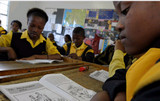
Most of the 82 primary schoolchildren in the Western Cape and Gauteng have said that media freedom is one thing that should not be touched.
In part four of the Mail & Guardians Young Voices series, pupils were asked if they thought media freedom was important.
Our Coverage Young Voices: What do you think needs to be done to better education? Young Voices: Where would our youth raise their children one day? Children - the medias forgotten voices
Between November 2012 and January 2013, Media Monitoring Africa (MMA) asked primary schoolchildren aged 11 to 13 about current news topics.
In part four of the Mail & Guardian 's Young Voices series, pupils were asked if they thought media freedom was important. They seemed to understand the value of a free media and why it needed to be protected.
" … The media can tell us about government's weaknesses and strengths which is a good thing," said Uafhulufhedzea Netsianda from Naturena Primary School.
"If we know their weaknesses, we can come up with ideas to help them overcome their weaknesses," he said.
In previous videos , pupils were asked where they would raise their children, who they want to be the next president, and what can be done to fix the education crisis.
Half of the pupils said they wanted Democratic Alliance leader Helen Zille to be the next president and only 2% said they would vote for current President Jacob Zuma. Most of the Cape Town pupils said they would raise their children in South Africa but about 30% of the Johannesburg pupils said they would raise their children outside of Africa. Many of the children agreed that building more schools in rural areas was the way forward in improving education.
The interviews formed part of a project called Children and Media Championing Best Practice, funded by the European Commission, and aimed at improving the portrayal and participation of children in mainstream media.
Voices excluded from media
MMA aimed to give children who participated in the project the skills to engage with the news, analyse media content and become what the monitoring group labelled "media monitors".
The monitors attend Park Senior Primary School, Naturena Primary School and Troyeville Primary School in Johannesburg, and Pelican Park Primary School in Cape Town, and are mostly schoolgirls.
Research carried out by MMA showed that children account for only 9% of all news stories, showing that their voices are generally excluded from media.
However, children are capable of understanding what is happening in the world of politics, sports, entertainment, health and education, and can effectively voice their opinions if given the chance, said MMA.
The monitoring group's director William Bird said MMA has been working with children for 10 years and has seen how capable they are of understanding what is happening in the world around them.
"Far too often children and their voices are excluded not only from national debates, but all too frequently on issues that immediately affect them," he said.
"The numerous challenges facing South Africa's education system are well known, but often children's voices on how these problems affect them are not heard.
"While children are clearly the future, they are also the here and the now and should be given as much of a chance to voice their opinions as adults are," Bird added.
Photo by: David Harrison, (M&G)
By: Victoria John
Victoria studied journalism, specialising in photojournalism, at Rhodes University from 2004 to 2007. Read more from Victoria John Twitter: @Victoria_JohnMG
Source: Mail & Guardian
